NPP’s great U-turn, India-China implications, emergent new left, SJB’s self-sabotage
Thursday, 2 January 2025 01:01 – – 25
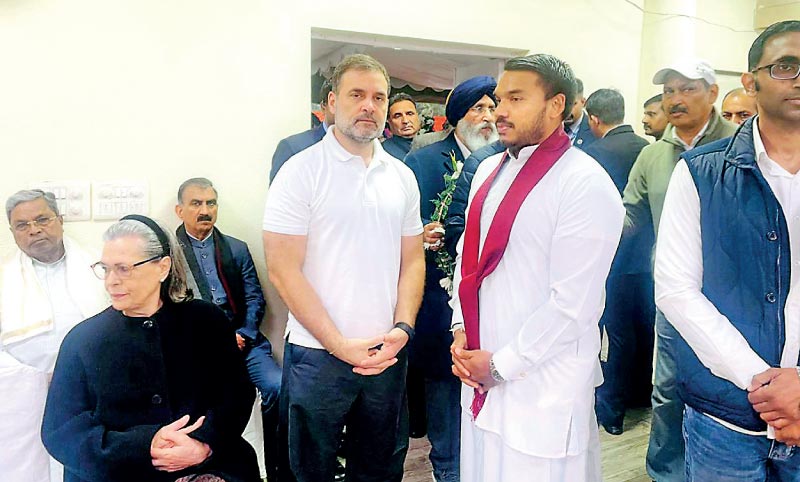
Namal pays respects to Manmohan Singh
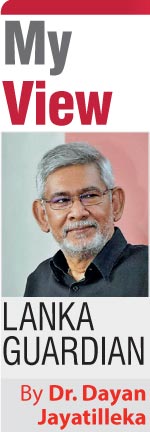 The AKD-led NPP government reminds me of two previous Sri Lankan governments rolled into one: the United Front coalition of 1970-1975 and the Yahapalanaya Government of 2015-2019. The LSSP-style leftist arrogance comes from the former, the UNP-style neoliberal agenda from the latter. (The only difference is that the academic and professional qualifications of the LSSP-CPSL parliamentarians were unquestionably authentic, not pretensions). Nothing in my observation of Lankan politics for 60 years tells me the current administration will be more than a one-term wonder.
The AKD-led NPP government reminds me of two previous Sri Lankan governments rolled into one: the United Front coalition of 1970-1975 and the Yahapalanaya Government of 2015-2019. The LSSP-style leftist arrogance comes from the former, the UNP-style neoliberal agenda from the latter. (The only difference is that the academic and professional qualifications of the LSSP-CPSL parliamentarians were unquestionably authentic, not pretensions). Nothing in my observation of Lankan politics for 60 years tells me the current administration will be more than a one-term wonder.
The dualistic character of contemporary Sri Lanka is best evidenced by the contrast between positive (41%) economic sentiment in the latest LMD poll of corporate executives and negative social sentiment (59%) that the country is headed is the wrong direction in the last IHP public opinion poll.
I’ve filched the phrase ‘The Great U-Turn’ from progressive-liberal economist (and President Clinton’s Secretary of Labour) Prof Robert Reich’s latest periodization of US economic history.
The JVP-NPP has not evolved as it should and could have, from a left-populist Opposition movement into a Social Democratic administration, guided by a social democratic economic policy and aimed at building a social democratic Sri Lanka. Instead, it has metamorphosed into the principal local agency of economic neoliberalism.
The Politics column of our sister Sunday paper has blown the whistle on how, why, who and when:
“…The dialogue between the UNP and JVP leaders years ago—a move that led to the rebranding of the JVP while retaining its original name—is indeed an interesting development. This rebranding resulted in the formation of the National People’s Power (NPP), which has since become a significant political force in Sri Lanka. The continued dialogue between the two parties, especially in formulating strategies and engaging with Indian leaders, highlights the evolving political dynamics in the country. This collaboration and strategic planning have played a crucial role in shaping the current political landscape. It is fascinating to see how these interactions and rebranding efforts have influenced the political scene.”
The reference to “the continued dialogue between the two parties [UNP-JVP], especially in formulating strategies and engaging with Indian leaders” is portentous.
In a lecture a few days back in New Delhi, ex-President Wickremesinghe has a frank, revealing interpretation of the 2024 India-Sri Lanka Joint Statement issuing from President Anura Dissanayake’s Delhi visit:
“…the strategy in this statement is to enhance Sri Lanka’s economic development by coupling our economic recovery with India’s sustained and swift economic growth and technological advancement,” he added. Wickremesinghe further said that it was expected that India would be the third largest economic power in the world by 2040. “By then, Tamil Nadu’s GDP (gross domestic product) would have exceeded $1 trillion. This is the powerhouse to which Sri Lanka has to connect as a region,” he asserted during the lecture chaired by former Union minister Suresh Prabhu…’
The geostrategic implications of such dependence are huge. Sri Lanka, a small island, cannot couple its economy with India’s while remaining strategically autonomous and non-aligned as between India and China, and more broadly the Quad and China.
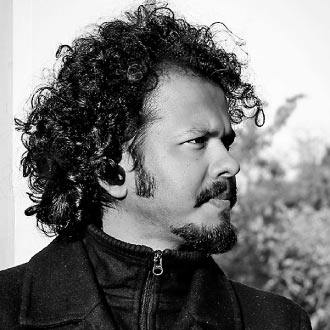 |
| Dr. Kalpa Rajapaksha, ‘New School’ and Econ/Peradeniya |
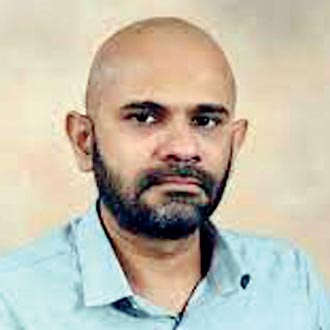 |
| Dhanusha Gihan Pathirana, political economist, author |
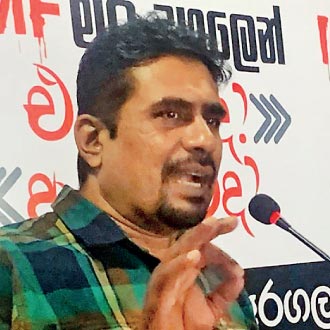 |
| Duminda Nagamuwa, FSP-PSA |
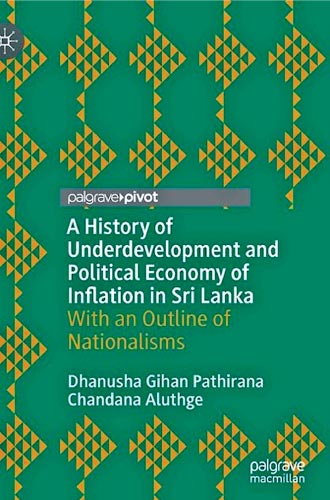 |
| Dhanusha Pathirana, Palgrave MacMillan, UK
|
NPP’s class character
The change in the role and function of the AKD’s NPP-JVP as indicated by its actions, its choice of policy pathways, is the window into the change of the class character of the government.
Class character is not determined by class or social composition. It is determined by two factors:
1. The ‘stand’ or ‘stance’, the vantage point, the perspective of which social classes, a leadership and Government views policy problems and picks possible solutions.
2. The social interests that a government primarily serves, usually at the expense of other social interests.
The authentic character of the NPP administration is revealed by the logic of its choices as authoritatively explained by Prof Anil Jayantha Fernando, Deputy Minister:
‘…Commenting on the ISB restructuring, he said the previous government had agreed in principle (AlP) on September 19, 2024 just two days prior to the Presidential election on restructuring ISBs and that the present government continued with the restructuring process and successfully completed the ISB restructuring on December 20, 2024.
“Ad Hoc Group (AHG) and Local banking consortium represent ISBs which account for USD 14.2 billion including a past due interest of USD 1.7 billion. By prioritising and facilitating actions in a timely manner, the new government has demonstrated a strong political commitment to steering the country toward economic stability. These efforts toward financial stability have been independently acknowledged by third parties, including rating agencies which have upgraded the ratings by several notches, which was only possible due to the correct prioritisation and implementation of economic stabilisation measures.
Therefore, the government continued with the restructuring process and facilitated it to ensure the successful completion of the issuance of new bonds for the exchange of existing ones on 20th December 2024 in order to achieve the critical objective of stabilising the economy in pursue of navigating the country with the growth and development trajectory towards a thriving nation and beautiful life,” he said…’
This was known by the NPP before it took office, and indeed, just before the Wickremesinghe presidency ended. Why then didn’t AKD and the NPP publicly say it has no choice but to comply? Why did it say the exact opposite?
Why does the NPP think now, but not then, that it has to complete a process that a President who did not have the legitimacy of a people’s mandate, had agreed to?
Why did it think that an agreement in principle arrived at in September 2024 between the Wickremesinghe presidency and the ISB holders, should be concluded by turning it into a formal deal in November, implemented beginning in December 2024?
Why was there no firewall or even a hiatus, between the agreement arrived at by the unelected neoliberal President and the elected ‘left-populist’ one?
It would have been a very strong argument across the table with the bondholders, that the new President was not bound by the agreement chalked-out by the outgoing, “unmandated” –Swathika Arulingam’s term– President Wickremesinghe? Even internationally, including in the global media and among global public opinion, it would have been a strong argument to emphasise that the NPP’s mandate was massive and radically different while Wickremesinghe was unsupported by no popular mandate at all. This would have given AKD and the NPP a strong hand in negotiations with which it could have cut a much better deal.
Furthermore, it is not as if President Ranil Wickremesinghe had actually signed a deal with the ISB holders. He had only chalked-out “99%”. Why did Anura and the NPP then feel compelled to complete an agreement which benefitted less than 1% of the Sri Lankan people (the local ISB holders) at the expense of 99% over the next decade, beginning 2025?
Anura’s ‘right adventurism’
Even if an unmandated, outgoing President had agreed to 99% of a deal, if AKD and the NPP thought it was a bad one—as it proclaimed–why didn’t it hit the brakes, buy time and space, and negotiate a better one?
Is it because President Dissanayake and the JVP-NPP thought it wasn’t a bad one, or wasn’t that bad, or any delay would be worse than signing a bad deal?
If so, why didn’t it lay out the details in Parliament, perhaps even invite credentialed nominees of the Opposition into the negotiating team so that a multi-party or bipartisan consensus was locked-in? Why the secrecy, the unilateralism, and the haste?
It is nonsense to blame the Government’s economic policy on officials. President Anura Dissanayake is the finance minister. It was he, not Nandalal Weerasinghe or Mahinda Siriwardena who chose to include the Chairman of the Ceylon Chamber of Commerce Duminda Hulangamuwa in the NPP’s National Economic Council, appointed him as one of his two Senior Economic Advisors, and sent him for all the key international negotiations on the ISB issue.
‘Adventurism’ –excessively risky haste–is a ‘deviation’ (secular version of a ‘sin’) in the Marxist-Leninist lexicon. It is twinned with ‘ultraleftism’. While clearly opting to contribute to swell the profits of the Western and local financial oligarchy/oligarchies i.e., the ISB holders, President AKD and the NPP have also unwittingly contributed to Marxist-Leninist theory. They have transformed ‘adventurism’ from an ultraleft deviation into a rightwing deviation, enabling the minting of a new category: ‘Right adventurism’, an inversion of the ‘Left adventurism’ that the JVP was justifiably accused of in 1971 and 1989.
When asked by a journalist “which is worse, the right deviation or the left deviation?” Stalin famously quipped “they are both worse”. Slavoj Zizek quotes this with delight in numerous works. That then is the JVP’s history for the most part: one or other ‘deviation’, each as bad as the other, and therefore, both ‘worse’.
The new intellectuals
As a radical left activist opposing the 1970 UF government in my pre-university teens (grilled by the Intelligence Services Division at Longdon Place) and an activist in the university student uprising of 1976, I appreciate the new young intellectuals who reject the pseudo-left herd mentality and by their very analyses, articulation and activity give us hope for the future.
They aren’t all of a single political or ideological persuasion. In my last column I commended Kusum Wijetilleke, a liberal-democrat/social democrat, and in this one I wish to draw the attention of the readers to two brilliant young political economists with a Marxist grounding, who have scanned the NPP government’s debt deal and made projections complete with a timeline, about what’s to come starting 2025 and growing by leaps from 2027-2028.
One is Dr Kalpa Rajapaksha, whose PhD is from the prestigious New School for Social Research, New York. It was founded by the thinkers of the Frankfurt School for Social Research—the iconic ‘Frankfurt school’– who emigrated to the USA to escape the Nazi torture chambers or worse. Kalpa is on the staff of the Department of Economics at Peradeniya. In a recent seminar he combined his rigorous training in political economy with a refreshing intellectual fearlessness, naming the class interests the NPP Government serves and the class character they reveal. (https://www.facebook.com/share/v/1DrvbckU4o/)
The other is Dhanusha Gihan Pathirana whose book on underdevelopment and Sri Lanka’s political economy has been published in London. Interviewed by Niresh Eliyatamby, his rollout of the timetable and totals of our impending debt repayment schedule is calm, lucid and scary as hell. (https://www.youtube.com/live/DdM-P5xV7ro?si=07uezqWwcTiep9Xx)
While Kusum Wijetilleke is a Working Committee member of the centrist-liberal SJB, Kalpa Rajapaksha and Dhanusha Pathirana are with the People’s Struggle Alliance (PSA) which is perhaps best described as being potentially to the Frontline Socialist Party what the NPP is to the JVP.
Even more heartening is that the different political locations of Kusum Wijetilleke on the one hand and Rajapaksha, Pathirana and Arulingam on the other, indicate a new critical intelligentsia arising in the broad Opposition space, parliamentary and extra-parliamentary. The Frontline Socialist Party (FSP) has its ‘organic’ intellectuals such as Pubudu Jayagoda and Duminda Nagamuwa who are powerfully articulate, analytical critics of the AKD-NPP administration’s policies. Nagamuwa’s sizzling lecture in Anuradhapura, December 28th is impressive. (https://youtu.be/wvVY8IZcfJc)
The FSP has also presented a constructive 22-point budgetary counter-proposal in a letter to the President.
The FSP-PSA configuration constitutes the New Left. The PSA is the platform of and for a New Left intelligentsia, consisting of minds critical of the JVP-NPP’s ‘embourgeoisement’ (‘bourgeoisification’).
The New Left is currently a microscopic minority in relation to the established and Establishment Left, the JVP-NPP. But by its own policy choices, the JVP-NPP has built on shifting sands, or to mix metaphors, placed itself on an inexorably downward moving escalator, while the New Left may gain credibility and traction as its economic analysis and projections begin to correspond to the material burdens and frustrations of the citizenry.
The lesson of 1970-1977 is that if the New Left doesn’t rupture with the Centre-Left Government –especially with the Left in Government– which is hurting the people economically, and develop into a truly mass party, the people will turn to a centre-right/Right alternative.
Harshanomics and SJB standstill
SJB and Opposition leader Sajith Premadasa taking a relatively correct, constructively critical stance on the NPP’s debt restructuring deal.
This stance would serve the interests of the main Opposition as the economic pain resulting from the implementation of the debt deal mounts. Dr Harsha de Silva has gone the exact opposite route, taking his cue from his old and ‘forever’ economic guru, Ranil Wickremesinghe’s endorsement of President AKD’s ISB deal.
“…Instead, he [Harsha] emphasized that the steady continuation of the existing economic framework has been instrumental in fostering the nation’s recovery.” (https://www.ft.lk/front-page/SJB-welcomes-SL-s-credit-rating-upgrade/44-770990)
The public will continue to get mixed signals from the SJB which will end up the same way as before, with another force surfing the inevitable backlash against the NPP’s debt deal when the economic pain of repayment comes. Harsha has not only praised the NPP’s debt deal, he has also praised Ranil’s formula and endorsed the NPP for following it. His only critique is that the NPP said something different earlier. But the people voted NPP precisely for what it said earlier, during the campaign, not for what it did to the contrary, i.e., what it has done now.
Harsha’s view of politics is absurd, even surreal:
a. He discerns no causative connection between politics and economics.
b. He always places economics above politics.
His presentations during the wastefully expensive three rollouts of ‘The Blueprint’ 2022-204 highlighted Ranil’s terms 2001-2003 and 2015-2019 as landmarks where Sri Lanka on the UNP’s watch got the economics right, but it was derailed by center-left/left ‘statists’ who opposed the economic programs. Harsha endorsed Ranil’s austerity program and ongoing shrinkage of the economy 2022-2024. He failed to note the obvious:
i. Every time Ranil got the economics correct by Harsha’s evaluation, Ranil and the UNP were kicked out by the voters—2024 being the latest instance.
ii. It wasn’t that the masses were misled by the malicious propaganda of left/center-left statist-nationalists. It is that those parties won elections by positioning themselves approximately along the lines they accurately identified as those of predominant public opinion.
Supply and demand– political supply of social demand–determine electoral outcomes in the democratic marketplace.
If Harsha’s line on the NPP’s debt restructuring becomes identified in the mass mind as the SJB line and what to expect under an SJB Government, the voters will do exactly what they did in 2024 and go looking for an alternative to both the NPP govt as well as the SJB. That could be:
I. A Left alternative either (a) outside the JVP/NPP or (b) from within it.
II. A nationalist-statist-populist backlash led by ‘Young Mahinda’ or ‘neo-Mahinda’ (not ‘neo-GR’) Namal Rajapaksa.
‘Harshanomics’ wrecks SJB’s electoral politics, triggering a destructive inner-party centrifuge. Harsha is not the SJB’s solution. Harsha more than Sajith is part of the SJB’s problem.
[For my electronic archive, visit: https://dayanjayatilleka.webflow.io/]





